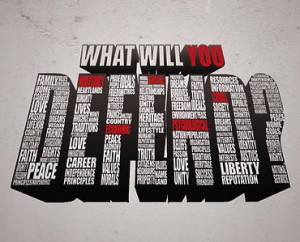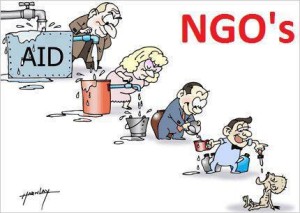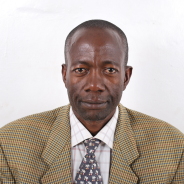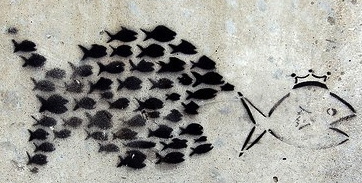As the issue of corruption is being probed more closely lately, Barongo ba Kafuuzi Ateenyi writes this guest post in response to “Aid, Africa, Corruption, and Colonialism: An Honest Conversation.” Excerpts in the original article to which he is responding are in italics.
**********
From Dr. Chris Etuka Obinwa (Researcher): “The people at the grassroots in the home countries are not involved from the takeoff stage to the conclusion of the projects. Secondly, the policies designed are at variance with the home countries policies. Thirdly, lack of sustainability of most projects. These create a huge gap which those involved take undue advantage of.”
Ateenyi responds: People at the grassroots not involved in the inception, design, implementation, and evaluation of aid projects is not the fundamental explanation for why aid has failed. Rather, the people at the grassroots are often not involved because they lack a voice.
This should not be blamed on the initiators of the projects—the foreigners—but the very home country systems that compromise the target recipients. What do you expect when, in your so-called home country, you are not accorded the respect you deserve as human? You cannot effectively criticize government, logically participate in choice of leaders or decision-making, or even reject leaders that you regard unworthy. In these circumstances, why should one expect other people—foreigners—to give the locals the respect they deserve? Indeed, they, as foreigners must be guided and must take guidance from local institutions. After all, charity begins at home.
 Besides, our current circumstances are such that nothing real can become of any such aid monies, especially due to excessive corruption and socio-political instability due to prevalent dictatorship. So, who is to blame, notwithstanding the connivance of the so-called donors?
Besides, our current circumstances are such that nothing real can become of any such aid monies, especially due to excessive corruption and socio-political instability due to prevalent dictatorship. So, who is to blame, notwithstanding the connivance of the so-called donors?
How can there be sustainability to aid projects when: there is theft or looting of the resources; people lack a voice to participate and decide on the right choices, i.e. to own the projects; and a careless government system that is not responsive to the people. Therefore, projects’ inception from outside our home countries is only incidental, due to the true prevailing circumstances on the ground. Suffice then to say, are Africans are more or less orphans, without any responsible guardian or government to cater for their needs?
What does anybody expect? What do you do when you intervene for a population that, for one reason or another, cannot effectively participate? What do you do for a population that cannot, in fact, fully express themselves because they are effectively sat upon by their government systems?
**********
Godifri Mutindi (Learning Advisor & Consultant): “The agency theory shows that people naturally chase their own [interests], rather than other people’s or even the group objectives. Going back to traditional Africa, the community welfare system, which was to take care of orphans, was abused. Philanthropists take advantage of this goodwill from the public—that they are people who want to improve the marginalised’s welfare and chase their own interests. History has shown that even religious movements (those who are supposed to be the greatest philanthropists) and the socialist governments are very corrupt. When there is little accountability and transparency, especially in Africa, this is a recipe for disaster.
“Poverty is big business all over the world, not only in Africa. In this big business, where billions are poured by donors and bilateral partners, governments (through well-connected officials) and NGOs (including international ones) have a big party. Are these entities, who abuse and enjoy poverty-related resources, particularly interested in solving the real problem—poverty, ignorance and discrimination?”
Ateenyi responds: The agency theory is only natural, for, if one lacks self-interest, they cannot achieve anything in life. Self-interest is the elementary driving force for any human achievement in the world. Of course, self-interest may exhibit itself in many ways, modest to adverse. Some people feel actualized best by giving their all to others, i.e. self-less interest; while others feel actualized by grabbing endlessly what belongs to others. This is the continuum.
 In modern humanity, the concept of a government as a body that takes care of society is also only natural. This derives from Jean Jack Rousseau’s theory of social contract. Indeed, humanity must appreciate that at individual and primitive level we are faced with many challenges that we cannot surmount except in society form. And as a function of society, government arises to fulfill millions of needs that as individuals we would not contend with. I guess this is the logic behind the so-called philanthropic movements. Despite expectations from them, governments have sometimes genuinely or not failed to deliver to the people, thus indirectly inviting the intervention of philanthropic movements or civil society to fill the gaps. This is not unique to Africa but can be found all over the world. Therefore, the view that philanthropists take advantage of the legacy of the old traditional African community welfare system in order to masquerade as promoters of the marginalised’s welfare, is not strong. Foreigners, or even the private sector, don’t have the mandate to serve the public good. They are merely operating in their self-interest. So why should anybody expect foreigners to serve the greater good for Africans? The first responsibility should be ours to protect what is ours and use it to our best.
In modern humanity, the concept of a government as a body that takes care of society is also only natural. This derives from Jean Jack Rousseau’s theory of social contract. Indeed, humanity must appreciate that at individual and primitive level we are faced with many challenges that we cannot surmount except in society form. And as a function of society, government arises to fulfill millions of needs that as individuals we would not contend with. I guess this is the logic behind the so-called philanthropic movements. Despite expectations from them, governments have sometimes genuinely or not failed to deliver to the people, thus indirectly inviting the intervention of philanthropic movements or civil society to fill the gaps. This is not unique to Africa but can be found all over the world. Therefore, the view that philanthropists take advantage of the legacy of the old traditional African community welfare system in order to masquerade as promoters of the marginalised’s welfare, is not strong. Foreigners, or even the private sector, don’t have the mandate to serve the public good. They are merely operating in their self-interest. So why should anybody expect foreigners to serve the greater good for Africans? The first responsibility should be ours to protect what is ours and use it to our best.
**********
Jennifer Lentfer (Creator of how-matters.org): “The problem persists because local civil society organizations are currently the lowest common denominator of international development assistance. I think it’s time to recognize local initiatives and indigenous organizations as vital to supporting demand-driven development that can genuinely challenge power asymmetries, and unleash social change.
“We continue to witness Southern organizations or ‘partners’ being rebuilt into more professional organizations that lose their character and represent only the interests of the community that align with funding or Northern NGO guidelines. This should ultimately lead us all to ask – whose interests are really being served?”
Ateenyi responds: I think we need to start from the beginning by asking why, in the first place, do we even have civil society? Civil society comes about because a vacuum in service delivery and human rights protection that has been left by the mandated government. It also exists in otherwise rich or developed conditions in developed countries. The role of ‘local initiatives and indigenous organizations’ is welcome, but like I have all along argued, the challenge comes from our governments. They do not tolerate a voice or participation.
 The derailment of local NGOs focus by aid donors is real. But is the need on the ground real or just imagined? For if it was real, then we wouldn’t see these local NGOs being derailed by anybody. Remember there is also the employment issue embedded. People are finding ways to survive. This is what happens here. In other words, it is business as usual if any intending NGO discovered that they after all would not get funding for their desired activities, they will re-shape their activities to the whims and fancies of the promising donor. Of course this may be a sweeping assertion, but I can’t blame them. We have all been rendered weak and vulnerable by our very systems that should advance us.
The derailment of local NGOs focus by aid donors is real. But is the need on the ground real or just imagined? For if it was real, then we wouldn’t see these local NGOs being derailed by anybody. Remember there is also the employment issue embedded. People are finding ways to survive. This is what happens here. In other words, it is business as usual if any intending NGO discovered that they after all would not get funding for their desired activities, they will re-shape their activities to the whims and fancies of the promising donor. Of course this may be a sweeping assertion, but I can’t blame them. We have all been rendered weak and vulnerable by our very systems that should advance us.
**********
Njoroge Kabugu (Student and blogger at The Bigger Village): “I do agree and would also add that we as an African people do know the solutions to our problems to begin with. Can we not form or support local and national NGOs that are run on ethical principles, and also that push for public policy that will strengthen the NGO sector? I know we have organizations that can dig wells, construct schools, provide financial services etc. which, if there were the right policies, would be used at the national level to provide those services that the international NGOs do. When a donor gives a grant in the US, they do not have one of theirs employed to follow the money. The same should follow for Africa.
“On another note we in the Diaspora also need to support our NGOs in Africa. We can create an umbrella organization that can influence public policy, set ethical standards, monitor local and international aid, exposing corrupt practices by both the local and international NGOS, as well as providing funding to organizations on the ground that are up to par on how they conduct business.”
Ateenyi responds: I too think we as an African people know the solutions to our problems. But poor as we are, we cannot possibly dictate terms to your donors. A beggar has no choice. ‘Biting the fingers that feed you’, is what this might be called!
 I doubt how much resources the Diaspora has to support our NGOs in Africa. You need to sustain the flow, remember? Or else your efforts will come to naught. Persons out there (not all of them of course) have sent money for investment at home in Uganda, but such money has disappeared without a trace. And this has involved their presumed true confidants, including relatives at home. What accountability mechanism, therefore, are you going to put in place so close to such a hole? I’m anxious to learn.
I doubt how much resources the Diaspora has to support our NGOs in Africa. You need to sustain the flow, remember? Or else your efforts will come to naught. Persons out there (not all of them of course) have sent money for investment at home in Uganda, but such money has disappeared without a trace. And this has involved their presumed true confidants, including relatives at home. What accountability mechanism, therefore, are you going to put in place so close to such a hole? I’m anxious to learn.
You can rest assured I truly share in your pain, disappointment, and frustration with our situations.
Nevertheless, I believe the solution is very different. We must start with human rights and governance.
**********
 Barongo ba Kafuuzi Ateenyi lives in Uganda, and has consulted for several local and international governmental and non-governmental organizations in Uganda, specializing in surveys, project planning and design, and monitoring and evaluation. He has also managed an online advocacy platform for human rights and development. He holds post graduate diplomas in public administration and management and in refugee law and forced migration studies.
Barongo ba Kafuuzi Ateenyi lives in Uganda, and has consulted for several local and international governmental and non-governmental organizations in Uganda, specializing in surveys, project planning and design, and monitoring and evaluation. He has also managed an online advocacy platform for human rights and development. He holds post graduate diplomas in public administration and management and in refugee law and forced migration studies.


Jen this is just so true and I share the sentiments of these African sons & daughters of the soil. As long as our development is driven externally there is no hope for us, we shall always be a playground for trials, tests and experiments. The person who should ideally have the best interests of Africa at heart has to be the African, but even then if unguided by the person who has the need he/she shall be driven by self interest..unguided self interest leads to corrupt practices and greed.
We are not happy being where we are..but self interest is destroying even home grown interventions that are coming from a safe place. As long as we remain vulnerable, we shall be dependent on the hands that feeds us, and no way are we going to try and bite it. I am total agreement that Africa needs an African solution that will be totally embraced by the African person, who is willing to die pushing..at the end of the day as long as we view Africa from an outsider looking in, we shall be eating the scraps that fall from the table of the West. In my view the people are the best advocates for Africa are those who have an insider perspective to the challenges of Africa and have an experience living within the boundaries of Africa, interacted with the people, not just the government processes and systems.
At the end of the day Africa shall live because Africans have woken up to the reality that we possess internal resources and our solution cannot be imported like we are importing foreign concepts. Its not a one glove fits all even in the best replication models, they still need to be customized to fit our situation. The answer lies with us.
I wrote an article for Social Work Helper: http://www.socialworkhelper.com/2014/01/31/poverty-think-beggars-comfortable-handouts/